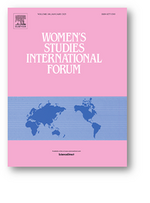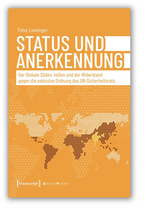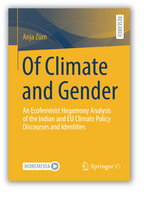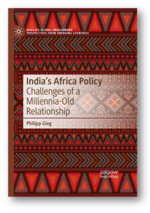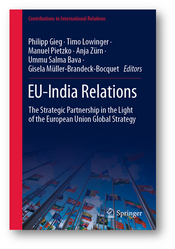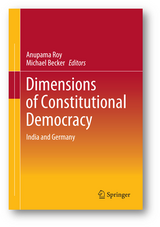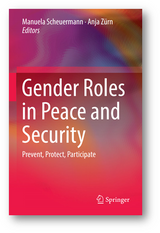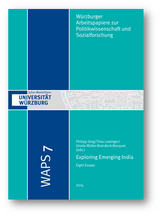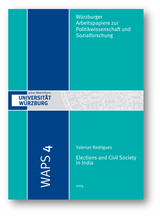Publikationen
Auf dieser Seite finden Sie Publikationen, die im Rahmen des Indien-Forums von seinen Mitgliedern oder Gastprofessor*innen veröffentlicht wurden.
Special Issues
Special Issue – (Re)Writing Global Gender Norms: The Role of Southern Actors
Soumita Basu / Philipp Gieg / Peace A. Medie (Hrsg.)
Women's Studies International Forum, Volume 108, 102999
Erschienen 2025
Global gender norms are negotiated and written in international arenas, with the participation of state and non-state actors. However, these norms are often associated with intellectual traditions, historical and cultural processes, and policy interests of the Global North; practices and histories from the Global South are often side-lined. The Special Issue presents evidence-based critique of such power asymmetries, and demonstrates how Global South actors have informed globally negotiated gender norms. Contributions on/from Africa, Asia and Latin America spotlight insights for realizing progressive and more effective norms, that emerge from the contestations between the local and the global. The focus is not only on ‘vertical’ intersections, but also ‘horizontal’ ones whereby transformative gender politics in one part of the world can inspire efforts of the marginalized elsewhere.
Monographien
Status und Anerkennung: Der Globale Süden, Indien und der Widerstand gegen die exklusive Ordnung des UN-Sicherheitsrats
Timo Lowinger
Erschienen 2025
transcript, Bielefeld
Sprache: Deutsch
434 Seiten
ISBN: 978-3-8376-7876-5
Wie kämpfen Staaten des Globalen Südens um Anerkennung in einer exklusiven, westlich geprägten Weltordnung? Ausgehend von der Kritischen Theorie der Anerkennung entwickelt Timo Lowinger ein neues Statusmodell globaler Anerkennung, das den Widerstand des Globalen Südens theoretisch wie empirisch fassbar macht. Dabei stellt er als Beispiel für den Ruf nach Gerechtigkeit und einer inklusiveren Weltpolitik Indiens Kampf um einen ständigen Sitz im UN-Sicherheitsrat ins Zentrum seiner Analyse, was besonders vor dem Hintergrund einer zunehmend hindunationalistisch geprägten Außenpolitik von besonderer Relevanz ist – eine kritische Perspektive für alle, die globale Machtstrukturen verstehen und kritisch hinterfragen wollen.
Of Climate and Gender: An Ecofeminist Hegemony Analysis of the Indian and EU Climate Policy Discourses and Identities
Anja Zürn
Erschienen 2024
Springer VS, Wiesbaden
Sprache: Englisch
405 Seiten
DOI: 10.1007/978-3-658-46774-6
ISBN: 978-3-658-46773-9
ISBN eBook: 978-3-658-46774-6
What significance do gendered discourse structures have for the state identity of India and the EU when it comes to their respective climate policies? This question is the focus of the study, which offers a comprehensive analysis of the climate discourse of the emerging power India and the EU, often described as a leader of climate change governance. Following the assumption that, although a wide variety of solutions to the greatest challenge of our time – the climate crisis – have been formulated, politicians of various states and regional organisations opt almost exclusively for technological responses, this study explores one possible cause: firmly anchored gender structures within both the Indian and EU climate discourses. Anja Zürn employs the ecofeminist hegemony analysis she developed for this study, first reconstructing the climate policy identities of India and the EU, and then subjecting them to an ecofeminist critique.
India's Africa Policy – Challenges of a Millennia-Old Relationship
Philipp Gieg
Erschienen 2023
Palgrave Macmillan, Singapur
Sprache: Englisch
413 Seiten
DOI: 10.1007/978-981-19-6849-5
ISBN Hardcover: 978-981-19-6848-8
ISBN eBook: 978-981-19-6849-52
Nach einer Skizzierung der historischen Entwicklung und der normativen Grundlagen der indisch-afrikanischen Beziehungen analysiert das Buch, wie sich Indiens Aufstieg zu einer Emerging Power auf die Afrikapolitik Neu-Delhis ausgewirkt hat – und welche Herausforderungen sich daraus für Neu-Delhis Engagement auf dem Kontinent ergeben. Indien und Afrika haben eine Jahrtausende alte gemeinsame Geschichte. Heute ist Indien nach China einer der größten Handelspartner Afrikas. Das Land gewährt afrikanischen Staaten regelmäßig Kreditlinien in Milliardenhöhe, und seine Pharmaproduzenten beherrschen viele afrikanische Märkte; fast ein Fünftel der indischen Erdölimporte und mehr als ein Viertel der Erdgasimporte kommen vom Kontinent. Die Beziehungen zwischen Indien und Afrika sind jedoch bei weitem nicht auf die wirtschaftliche Zusammenarbeit beschränkt. Das Buch untersucht drei außenpolitische Bereiche: (1) Indiens Außenwirtschaftspolitik gegenüber Afrika mit einer eingehenden Analyse des indisch-afrikanischen Handels, der Investitionsbeziehungen und indischer Lines of Credit; (2) Neu-Delhis Entwicklungszusammenarbeit mit Afrika, ihre Grundsätze, Instrumente und ihr Umfang; (3) Indiens politisch-diplomatische Außen- und Sicherheitspolitik gegenüber Afrika, einschließlich Neu-Delhis High-Level Diplomacy, Sicherheits- und Diasporapolitik sowie multilaterale Afrikapolitik.
Herausgeberbände
EU-India Relations – The Strategic Partnership in the Light of the European Union Global Strategy
Philipp Gieg / Timo Lowinger / Manuel Pietzko / Anja Zürn / Ummu Salma Bava / Gisela Müller-Brandeck-Bocquet (eds.)
Erschienen 2021
Springer, Cham
Sprache: Englisch
DOI: 10.1007/978-3-030-65044-5
ISBN: 978-3-030-65044-5
India and the European Union bear a particular responsibility: as international relations change, not least because of the global COVID-19 pandemic, the two largest democracies in the world have the unique potential to jointly demonstrate that trusting cooperation and mutual understanding are both indispensable and fruitful—all the more so in the context of increasing national egoism and disregard for the fundamental principles of multilateralism. This realisation is not new. Believing in the necessity and mutual benefit of close cooperation, India and the EU struck a strategic partnership in 2004. But resounding success in forging closer bilateral ties and promoting an inclusive, rules-based global order has proved elusive. Since 2016, however, the EU’s Global Strategy has offered new opportunities for a restart of European foreign policy, envisaging new partnerships and recalibrating existing ones. On India’s part, too, changing stances have presented new openings—with New Delhi criticising protectionism and calling for a strengthening of multilateralism. This timely book scrutinises the status quo and the future potential of revitalised EU-India relations. By exploring and analysing conceptual approaches to and key dimensions of the strategic partnership, including trade, climate policy and development cooperation, it evaluates the prospects for future cooperation. Lastly, it offers policy recommendations for advancing the partnership between India and the EU.
Dimensions of Constitutional Democracy. India and Germany
Anupama Roy / Michael Becker (Hrsg.)
Erschienen 2020
Springer, Cham
Sprache: Englisch
DOI: 10.1007/978-981-15-3899-5
Der Sammelband enthält 11 Beiträge zum Thema "Konstitutionelle Demokratie". Im Anschluß an eine umfangreiche Einleitung befassen sich die einzelnen Kapitel u.a. mit den Themen Nationalismus, Säkularismus, Rule of Law, Grundrechten und sowie den "Versprechungen", die die Verfassungen Indiens und Deutschlands enthalten. Das Buch ist ein Produkt der engen Zusammenarbeit zwischen dem Lehrbereich Politische Theorie des Instituts für Politikwissenschaft und Soziologie und dem Centre for Political Studies der Jawaharlal-Nehru-University. Es enthält Beiträge zweier Tagungen in Würzburg und Neu-Delhi, die gemeinsam von den ProjektpartnerInnen Prof. Anupama Roy und Prof. Michael Becker geplant und durchgeführt wurden. Die langjährige Kooperation wurde ermöglicht durch Mobilitätsmaßnahmen des Projekts „Foundations of the Indo-European Strategic Partnership“. Die Veröffentlichung im Rahmen des Projekts „Foundations of the Indo-European Strategic Partnership" wurden durch den Deutschen Akademischen Austauschdienst (DAAD) aus Mitteln des Bundesministeriums für Bildung und Forschung (BMBF) gefördert.
Gender Roles in Peace and Security: Prevent, Protect, Participate
Manuela Scheuermann / Anja Zürn (Hrsg.)
Erschienen 2019
Springer, Cham
Sprache: Englisch
DOI: 10.1007/978-3-030-21890-4
Der Herausgeberinnenband "Gender Roles in Peace and Security. Prevent, Protect, Participate" vereint zwölf Beiträge zu Genderrollen in Frieden und Sicherheit sowie Fragen der Umsetzung der Women, Peace and Security Agenda der Vereinten Nationen. Dr. Manuela Scheuermann und Anja Zürn vom Jean-Monnet-Lehrstuhl der Professur für Europaforschung und Internationale Beziehungen an der Julius-Maximilians-Universität Würzburg sind die Herausgeberinnen. Die Autor_innen analysieren den Umsetzungsprozess der Resolution 1325 des Sicherheitsrates der Vereinten Nationen und diskutieren verschiedene Herausforderungen im Zusammenhang mit der Agenda. Mittels Fallstudien werden unter anderem geschlechtsspezifische Mechanismen von Friedensprozessen, Gender-Trainingspraktiken für Polizist_innen, Fragen zu sexueller und genderbasierter Gewalt und die Bedeutung der Gewaltprävention untersucht. Neben dem UN-Sicherheitsrat und der UN-Bürokratie, werden die EU, die NATO sowie die Rolle der Zivilgesellschaft im Rahmen der WPS-Agenda betrachtet. Der Band vereint verschiedene fachdisziplinäre und theoretische Zugänge. Feministische Theorien, Ansätze der Organisations- und Sicherheitsforschung und verschiedene Konzepte der Masculinity werden ebenso herangezogen wie Gender Mainstreaming und poststrukturalistische Ansätze. Juristische, politikwissenschaftliche und soziologische Perspektiven werden dabei berücksichtigt. Die Veröffentlichung im Rahmen des TM5 "The Challenge of Gender" des M.S. Merian – R. Tagore International Centre of Advanced Studies ‘Metamorphoses of the Political’ (ICAS:MP) wurde durch das Bundesministerium für Bildung und Forschung (BMBF) gefördert.
Beiträge in Fachzeitschriften und Sammelbänden (Auswahl)
-
Gieg, Philipp / Müller-Brandeck-Bocquet, Gisela:
Navigating Norms and Pragmatism in EU-India Relations: Multilateralism, Connectivity, and the Future of the Strategic Partnership
In: Jopp, Mathias / Pollak, Johannes (eds.) (2025): The European Union’s Geopolitics. The Lackluster World Power, Cham: Springer., pp. 263-292.
DOI: 10.1007/978-3-031-74587-4_13 - Gieg, Philipp:
Indien und seine Entwicklungszusammenarbeit
In: Müller, Markus Hans-Peter (Hrsg.) (2024): India in the 21st Century – On its way to a post-industrial economy, Wiesbaden: Springer Gabler, pp. 205-224.
DOI: 10.1007/978-3-658-43014-6_12
- Gieg, Philipp:
Indien als sicherheitspolitischer Akteur im westlichen Indischen Ozean: Ein Kooperationspartner mit Potenzial für die Europäische Union?
In: Gieg, Philipp / Lowinger, Timo / Pietzko, Manuel / Rüger, Carolin / Scheuermann, Manuela / Zürn, Anja (eds.) (2023): Jenseits der Krisen: Potenziale der europäischen Integration im 21. Jahrhundert, Wiesbaden: SpringerVS, pp. 115-149.
DOI: 10.1007/978-3-658-41608-9_5
- Lowinger, Timo:
The India that can’t say yes? Weltinnenpolitik und die theorieimmanente Exklusion des Globalen Südens
In: S+F Sicherheit und Frieden, 37:4 (2019), pp. 202-207.
DOI: 10.5771/0175-274X-2019-4-203
- Gieg, Philipp:
Same Same but Different? India–Africa Relations and Chinese Involvement in the Continent
In: Insight on Africa 8:1 (2016), pp. 40-58.
DOI: 10.1177/0975087815612291
-
Gsänger, Matthias:
„We are not going just to copy“: Der indische Demokratiediskurs von den 1920er Jahren bis zur Verfassunggebenden Versammlung
In: Sophia Schubert, Alexander Weiß (eds.): "Demokratie" jenseits des Westens, PVS Special Issue / Sonderhaft 2016, pp. 511-534.
DOI: 10.5771/9783845261904-512 - Gieg, Philipp:
Modi-fying India-Africa Relations? The New Government’s Africa Policy and the 3rd India-Africa Forum Summit
In: FPRC Journal 24: India-South Africa Relations, Issue 4/2015, pp. 49-57.
Würzburger Arbeitspapiere zur Politikwissenschaft und Soziologie (WAPS)
Exploring Emerging India – Eight Essays
Philipp Gieg / Timo Lowinger / Gisela Müller-Brandeck-Bocquet (eds.)
WAPS 7
Veröffentlichung: 12.10.2015
Sprache: Englisch
DOI: 10.25972/OPUS-11997
India's economic rise since the 1990s has been followed by a more prominent global role for the country. Despite economic setbacks in recent years and huge domestic challenges like poverty, caste issues, and gender inequality, India today is almost universally characterised as an “emerging power”. At the same time, the country continues to show an enormous diversity. Thus, exploring emerging India can surely not be confined to economic analysis only. Instead, it is vital to take current developments in domestic and international politics, society, culture, religion, and political thinking into consideration as well.
Following an interdisciplinary approach, contributions from Political Science, International Relations, Indology, Political Theory, and Economics are fundamental in order to grasp the country's diversity. This collection assembles eight essays which, individually, serve as working papers reflecting the authors' various research focuses, while collectively composing a multifaceted and multidis-ciplinary picture of emerging India. It thereby reflects the approach the University of Würzburg’s Centre for Modern India and the Institute for Political Science and Sociology’s India Forum are committed to: bringing together different academic disciplines in order to generate nuanced insights into India’s manifold diversity.
Elections and Civil Society in India
Valerian Rodrigues
WAPS 4
Veröffentlichung: 30.10.2014
Sprache: Englisch
DOI: 10.25972/OPUS-10500
The analysis of the 2014 elections to Lok Sabha in India describes the results and their enormous extent with a differentiate regard to social group voting. Considering the election campaign’s performativity and issues of contestation the landslide victory of BJP (Bharatiya Janata Party) will be illuminated. Through a closer examination of party coalitions, the electoral system, and the leadership factor the BJP’s clear victory over Congress Party will be explained. Besides the opportunity for significant economic and political reforms, the author conjectures a potential for dangerous tendencies to Indian democracy owing to such a resourceful government, which are compared with the government constraints, especially by federal arrangements. The second part of the article argues that civil society in India is composed of several layers that are distinct and overlap at the same time.
Five versions of the same are significant: 1) institutions avowing secular nationalism that upholds inclusive citizenship, equality of treatment, and non-discrimination; 2) a phalanx of institutions inspired by the Gandhian idea of swaraj that are deeply vary of the state and its apparatus and envisage a life of freedom constituted around self-determining associations built from below; 3) such orientations and impulses which stress on religiously inspired values and traditions with its archetypal representation in Hindu nationalism; 4) those who highlight difference and diversity as central to Indian society and stress this fact as foundational to Indian nationalism; 5) and those who are in favour of a right-based approach to citizenship and rule of law in India. Alluding to these distinctive domains constitutive of civil society in India the paper argues that the success of the Bharatiya Janata Party, and the coalition that it led, in the General elections of 2014 rested on its ability in tapping resources from different layers of civil society while making institutions woven around Hindu identity as its anchor.

Die Aktivitäten des Indien-Forums am IPS werden durch
den Deutschen Akademischen Austauschdienst (DAAD) aus Mitteln
des Bundesministeriums für Bildung und Forschung (BMBF) gefördert.


